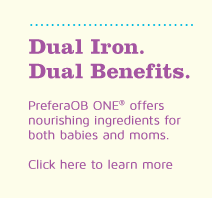Folate and folic acid help prevent birth defects
Folate is a B vitamin that helps prevent serious abnormalities of the brain and spinal cord called neural tube defects.1-4

Folate occurs naturally in green leafy vegetables like spinach and collard greens. Oranges, lemons, and other citrus fruits are also high in folate. Folic acid, the synthetic form of folate, can be found in fortified foods such as cereals, bread, flour, pasta, crackers, and orange juice.2,5
PreferaOB ONE® provides the folic acid women may not obtain through diet alone2
Experts recommend that before pregnancy and during early pregnancy women consume 400 micrograms of folic acid daily in order to reduce the risk of neural tube defects.2,5
PreferaOB ONE® contains 1 mg (1000 mcg) of folic acid.

